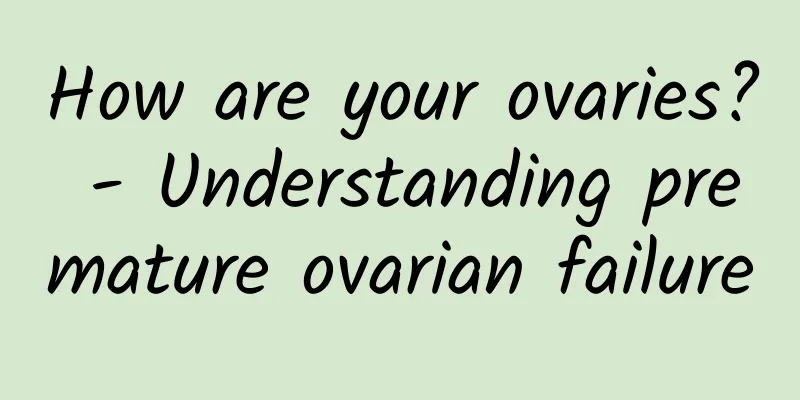How are your ovaries? - Understanding premature ovarian failure

|
Author: Teng Xiuxiang, Chief Physician, Beijing Hospital of Traditional Chinese Medicine, Capital Medical University Reviewer: Ruan Xiangyan, Chief Physician, Beijing Obstetrics and Gynecology Hospital, Capital Medical University With the accelerated pace of life and the increasing pressure of life and work, many women in their twenties and thirties have abnormal menstruation, such as early or delayed menstrual cycle, less menstrual flow, and shorter menstrual period. These conditions may indicate problems with ovarian function. Once this happens, it is recommended that women check their hormone levels and have a B-ultrasound of the uterus and ovaries on the 2nd to 4th day of menstruation. If the basal FSH (follicle stimulating hormone) level is elevated or the FSH to LH (luteinizing hormone) ratio is greater than 3.6, and the basal antral follicle count is too low, then combined with the menstrual situation, ovarian dysfunction can be diagnosed. 1. What stages does ovarian dysfunction go through? Ovarian function decline goes through four stages: normal stage, latent stage, biochemical abnormal stage and clinical abnormal stage. Normal period: Menstruation is normal, that is, the menstrual cycle, period, and menstrual volume are all normal. At this time, the ovarian reserve function is normal and the female reproductive ability is also normal. Latent period: Menstruation may be normal, and the basal FSH value is also normal, but the anti-Mullerian hormone (AMH) level decreases and the number of antral follicles decreases, which indicates that the female's reproductive ability may be in the beginning stage of decline. Biochemical abnormality period: FSH level is greater than 10IU/L, which is higher than the normal value, but menstruation may still be basically normal. Clinical abnormality stage: FSH levels increase further, and clinical manifestations include abnormal menstruation. When the FSH level is greater than 40 IU/L, it indicates that the ovarian function has failed. If this happens before a woman is 40 years old, it is called premature ovarian failure, which means premature ovarian failure. In 2016, the European Society of Human Reproduction and Embryology proposed a new concept called premature ovarian insufficiency, that is, the FSH level is greater than 25IU/L, amenorrhea, and it occurs before the age of 40. Before the diagnosis of premature ovarian insufficiency occurs in medicine, there is a concept in reproductive medicine called decreased ovarian reserve function. This situation refers to the fact that although some patients have abnormal FSH levels, they have not yet reached the diagnostic criteria for premature ovarian insufficiency, or have not even increased, and their anti-Mullerian hormone (AMH) levels have decreased. Anti-Mullerian hormone is secreted by preantral follicles and antral follicles. It can assess the number of follicles in the ovarian pool and can reflect the ovarian function more sensitively than FSH levels. A decrease in anti-Mullerian hormone levels indicates that the ovarian reserve function has decreased. In addition, the antral follicle count is also an evaluation indicator of the female ovarian function. On the 2nd to 4th day of the menstrual period, that is, under the basic condition, the normal antral follicle count of a woman should be greater than 6. If it is less than 6, it also indicates that the ovarian reserve function has decreased. A decrease in ovarian reserve function indicates a decrease in the number and quality of eggs, which also indicates a decrease in women's reproductive ability. 2. What causes premature ovarian failure? So far, there is still no medical consensus on what causes women's ovarian function to decline prematurely or even fail. It is generally believed that immune factors, iatrogenic factors, infectious factors, genetic factors, drug toxicity and side effects, and psychological factors are directly related to the onset of premature ovarian failure. Immune factors mainly include autoimmune diseases, such as rheumatoid arthritis, systemic lupus erythematosus, etc. Medical factors, the most common of which are surgical factors. For example, surgery for ovarian endometriosis cysts may damage the ovaries, causing a certain degree of physical reduction in the number of follicles, which may affect ovarian function to a certain extent. Infectious factors, such as mumps in childhood or adolescence, may contribute to ovarian failure in adulthood. Genetic factors. Premature ovarian failure has genetic factors. Those with a family history of similar diseases are at high risk of developing premature ovarian failure. Drug toxicity and side effects, such as taking some immunosuppressants and certain Chinese medicines such as Tripterygium wilfordii, have certain reproductive toxicity. Mental and psychological factors: Today's women are under great pressure at work and in life. Some women may experience anxiety and depression, which may lead to a decline in ovarian function over time. Traditional Chinese medicine documents of all dynasties also have relevant records of diseases similar to modern premature ovarian failure. For example, there is a description of the phenomenon of women's "cessation of menstruation before old age", which is actually similar to the concept of premature ovarian failure in modern medicine. According to traditional Chinese medicine, the kidney governs reproduction. When kidney qi is abundant, under the action of Tiangui, the Chong channel is abundant, the Ren channel is unobstructed, and the qi, blood and body fluids are abundant, so that the uterus can store and discharge regularly, menstruation occurs, and the cycle repeats. When kidney qi is insufficient and the Chong and Ren channels are deficient, it will lead to premature decline or even failure of ovarian function. Once premature ovarian failure is diagnosed, hormone replacement therapy is recommended medically, along with traditional Chinese medicine treatment. It is generally recommended that treatment continue until the normal menopausal age of the woman. 3. If there is no desire to have children, can premature ovarian failure be left untreated? Many female friends who suffer from premature ovarian failure think that since I have already given birth to children and have no desire to have children, does this mean that premature ovarian failure does not need treatment? In fact, this is a misunderstanding. In addition to the reproductive function, the ovaries also have endocrine functions. The ovaries secrete estrogen, and when the ovaries stop working, they no longer secrete estrogen. In our body, there are estrogen receptors in more than 40 tissues and organs. When estrogen is deficient, lipid metabolism becomes abnormal, low-density lipoprotein increases, and the risk of cardiovascular disease increases. When estrogen is deficient, calcium absorption is reduced, leading to osteoporosis. When estrogen is deficient, the urogenital tract will atrophy, the vagina will become dry, sexual life will be impaired, and an unharmonious sexual life will affect the relationship between husband and wife and the stability of the family. When estrogen is deficient, it can also lead to cognitive impairment and a significant decrease in memory, affecting work and life. Therefore, once premature ovarian failure is diagnosed, active and continuous treatment is required. |
<<: GSMA: 2018 Global Mobile Payment Industry Report
Recommend
Do you know what causes uterine tumors?
Uterine tumors are very common in middle-aged wom...
The best days for abortion
Artificial abortion means that a woman goes to th...
Can I eat Gorgon fruit during breastfeeding?
The diet during lactation is the same as that dur...
Why do I get acne on my face during menstruation?
Many female friends will encounter a problem, acn...
Why do girls have frequent urination and painful urination?
Some girls had no problems with urination before,...
What are the dangers of induced labor at 28 weeks?
Female friends must know in advance what harm ind...
What are the causes of urinary tract infection in women
Due to the special structure of the urethra and s...
How much estradiol is normal in IVF
If a woman has infertility, she can choose to use...
Eating well really makes you happier! A comparison of anti-depression foods, these are the most recommended →
In today's fast-paced urban life and increasi...
How to remove breast augmentation scars under the armpits
Breast augmentation is a way of achieving breast ...
How deep can you go when you are pregnant?
There is no clear regulation on how deep the pene...
What should women eat during confinement?
There are things to pay attention to, such as wha...
What is bloody and purulent leucorrhea? That's the situation
Under normal circumstances, women's leucorrhe...
What causes girls' loose skin?
The condition of the skin determines our mental a...

![[Medical Q&A] Is overeating a mental illness?](/upload/images/67f0e8c8b9565.webp)







